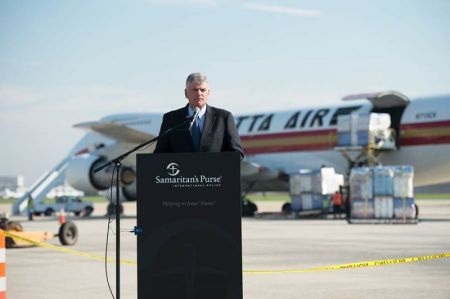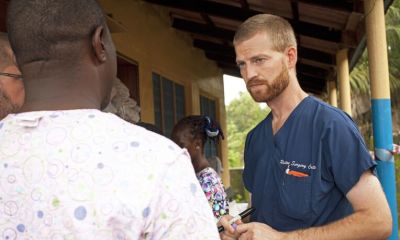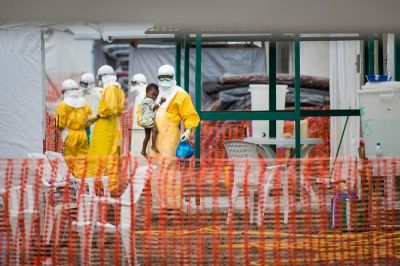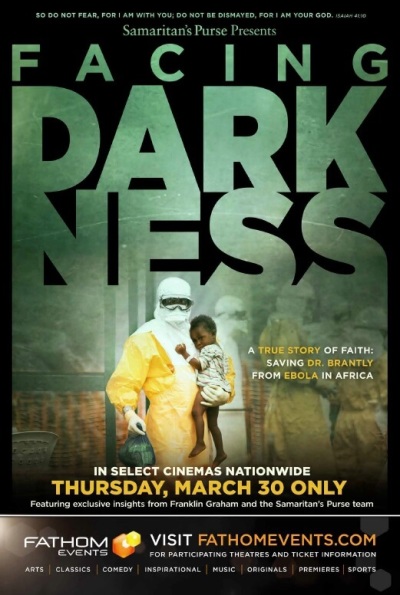Franklin Graham on 'Facing Darkness': I Questioned God After Ebola Outbreak

Executive Producer of "Facing Darkness," Franklin Graham says he questioned God after Dr. Kent Brantly was infected with Ebola while serving for Samaritan's Purse in West Africa.
"Facing Darkness" hits theaters for one night only on March 30 and tells the true story of two American aid workers in West Africa stricken with the deadly Ebola virus and the race against time to get them home and treated.
Samaritan's Purse President Franklin Graham says Ebola caught international attention when American workers Dr. Brantly and nurse Nancy Writebol became infected.
"To be honest when I first heard that Dr. Brantly had been infected, I didn't even know how to pray. At first, I just kept saying, 'God why? Why, [he's a] young doctor, such a great guy, why?'" Graham told The Christian Post.

"We had no clue how we were going to get him out of there and had no clue what to do. But we began to pray that God would show us what to do and we began to call every person that we knew," he said. "We called the State Department, the people in Washington, the Department of Defense. I mean everybody that we had a contact with, we began to call and as a result of it God began to open up doors."
The well-known evangelist said as he made the calls to help his Samaritan's Purse workers, he saw firsthand how God made a way out of an impossible situation.
"You could see God's hand at work through this entire film," Graham testified. "It's a documentary of God's faithfulness and [shows that] God is a good God, He's a loving God [and] He cares for us."
The Ebola outbreak first surfaced in March 2014 and infected more than 28,000 people in Liberia, Guinea and Sierra Leone. Brantly and Writebol found themselves at ELWA Hospital in Monrovia, Liberia, in the middle of the outbreak and wound up catching the disease themselves.
By June of that year it was all over the news as a raging epidemic and it was the bravery of the missionaries that helped bring international attention to the killer virus.
"Dr. Brantly, his life, God used that to wake America up and as a result there are tens of thousands of Liberians and people from Guinea and Sierra Leone that are alive today because America and the rest of the world woke up," Graham said. "God used Dr. Brantly and Nancy Writebol to draw attention to a crisis that was killing people by the hundreds and killing them by the thousands. The world was not paying attention until they got sick."

Overall, 11,000 lives succumbed to the disease before Ebola was under control.
The 64-year-old evangelist, who is president of Samaritan's Purse, shared what he tells people when they ask why God allows things like this to happen.
"With the question, 'Why does God allow bad things to happen?' — that's a question every generation has struggled with and I don't have answers for that," Graham said. "All I know is that God made us and that He created us. Because one man sinned, we now live in a fallen world and that's what we're dealing with — a sin sick world."
Fortunately, however, he celebrated the fact that the story doesn't end there. Graham went on to share that the Good News is the remedy.
"That's why God sent His son Jesus Christ into this world. That's why He took our sins and He died on the cross and He was buried for our sins. God raised Him to life and He can come into every heart and He can change every person that's willing to believe in the name of Jesus Christ," the president and CEO of the Billy Graham Evangelistic Association stated.
Graham credited the hope of the Gospel message for inspiring his team at Samaritan's Purse to go to Africa. They went with the belief that Jesus is the great physician and used their knowledge in medicine as a tool to show God's love to the people in Liberia.
"Dr. Brantly was there serving as a missionary in a hospital and his sole purpose was to tell the men and women that they served, about a God that loves them and cares for them," he revealed.
The missionaries faced other challenges when in Liberia. Complicating the situation was years of civil war and the people of Liberia had very little trust for anyone in authority, going so far as to blame the aid workers for spreading the disease. Hospitals and people were attacked. Yet the Samaritan's Purse team continued to serve.
"When Ebola came we were not prepared for that. We were not there to fight Ebola; none of my staff were. But when Ebola came, we stopped everything that we were doing to focus on trying to save the lives of those that were infected," Graham said.
The North Carolina native called "Facing Darkness" a "testimony" to God's faithfulness.

"He does hear prayer and answers prayer. Not only did Dr. Brantly survive, Nancy survived and we have others in this film who survived, who are giving a living testimony to God's goodness," he highlighted.
Graham believes the movie has the appeal to reach both Christians and non-Christians alike because of the effect Ebola had on the world.
"We want this film to not only reflect what happened at that time but to show that God answers prayer and that God will answer the prayer of any person that is willing to trust in the name of His son, Jesus Christ. If you just pray for God's help and His mercy, God answers prayer," he emphasized.
Liberia is now declared Ebola free because of a shift in culture that helped stop the spread of the disease. Samaritan's Purse was behind the massive public health education program that reached 1.5 million people.
"Facing Darkness" will not only tell the story of Brantly and Writebol, it will also show what happens when people choose compassion over fear in service to others.
The Arthur Rasco film will premiere in select U.S. movie theaters for one night through Fathom Events on March 30.
For more information, visit FacingDarknessMovie.com





















